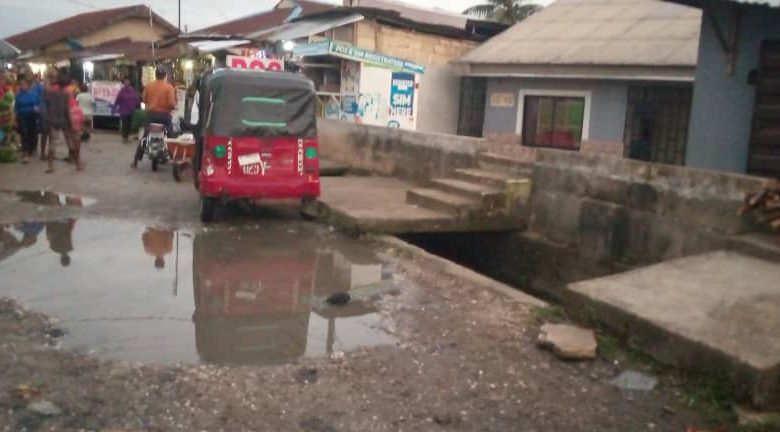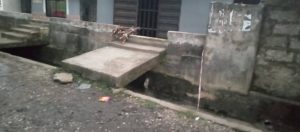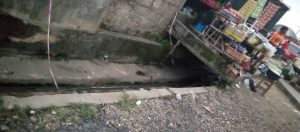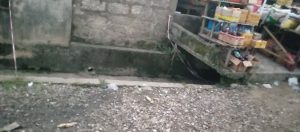
On an evening visit to Anua Market, located along the Nwaniba axis of Uyo, near Ekpri Nsukara Junction, this correspondent spotted an open drainage channel, locally referred to as an “open gutter”, running along the right side of the market’s entrance.
The reporter observed that market women were selling food items near this channel, which was wide enough to pose an environmental crisis for the public.
Tragically, a life was cut short recently as a result of this uncovered drainage, yet no action has been taken to address the situation.

Several people, who preferred to speak on condition of anonymity for fear of reprisal or community backlash, recounted the tragic incident.
A market woman told the Crystal Express Newspaper that a young man, believed to be in his early twenties, was swept into the open gutter earlier this year when a heavy rainstorm filled the channel during the late evening, making it unnoticed.
Unfortunately, the body of the victim was only discovered a few days later at a ravine in Eniong community.

Another man who owns a shop next to the market described the incident as unfortunate, explaining that although people gathered to rescue the young man, their efforts were in vain.
A woman who owns a shop in the market added that it is frightening whenever there is heavy rainfall because the gutter fills up with water, and anyone unaware of the danger could easily drown, just as the young man did.
This flood tragedy is also not new to the Ekpri Nsukara Offot Community. In 2024, a rampaging flood claimed the life of a four-year-old girl.
Related: Wailing, Agonies In Uyo Community As Erosion Wrecks homes, Farmlands, Kills 4 year Old Girl
Despite spirited rescue efforts, the toddler could not be saved, plunging her family and the entire community into grief.

In an interview with journalists, the village head, Eteidung Emem Denis Asikpo, had said that the residents would continue facing serious environmental and health risks unless the state government undertakes urgent action to address the devastation caused by flooding.
Such risks are not hypothetical in the state, as a 60-year-old petty trader was swept away by floodwaters from an open drainage along Abak Road, near Nkemba Street, in 2022.
In another incident, two people were found dead in a drainage channel near the GWT Petrol Station on Atiku Abubakar Way after heavy rains battered the city for several hours.
Unfortunately, there have been other similar tragic incidents that have not been reported or made it to the news.
These incidents indicate that open drainage channels in Akwa Ibom State, especially in public spaces such as Anua Market, are a silent environmental hazard that demands urgent attention.
Research shows that open drainage systems often pose health risks and contribute to environmental pollution.
Also, poor maintenance of these exposed gutters leads to sediment buildup, portholes with stagnant water splash, contamination of surface water, and reduction in groundwater replenishment, among other related impacts.
Over the years, residents of Akwa Ibom State have faced numerous challenges related to the prevalence of open drainage systems in urban areas, as is the case in Anua market.
During the rainy season, these channels pose problems ranging from loss of life and flooded streets to contaminated stagnant water, damaged road infrastructure, and unsanitary conditions, among other environmental consequences.
What is more worrisome is that some citizens dispose of their waste in these open drains, especially during rainfall, contributing to greater environmental hazards.
Apart from these effects, there are water-related diseases that can have health implications for indigenes who stay close to uncovered drains.
A 2024 report in Case Studies in Chemical and Environmental Engineering notes that these water-related vector diseases affecting health include waterborne illnesses, water-scarce infections, and water-based vector diseases. The report adds that such diseases have been identified as a major cause of rising death rates and hospitalisations worldwide.
The World Health Organisation has repeatedly warned that inadequate drainage systems in developing countries contribute significantly to the spread of cholera, malaria, other waterborne illnesses, and increased deaths.
Aligning with this statement, the Nigeria Centre for Disease Control and Prevention (NCDC) reports that since the start of the year in 2024, there have been 3,623 suspected cases of cholera and 103 deaths across 34 states and the Federal Capital Territory, many of which are fuelled by poor drainage systems, blocked drains, and stagnant water created during the rainy season.
Furthermore, the National Emergency Management Agency (NEMA) recorded 179 flood-related deaths across 15 states during the 2024 rainy season alone. These floods affected over 532,600 people, displaced 208,655 individuals, damaged more than 80,000 houses, and destroyed 107,652 hectares of farmland.
However, to reduce the dangers of open drainage channels in crowded public places such as Anua Market, the government should replace the infrastructure with enclosed drainage and redesign the public space to ensure safety.
Such measures would reduce accidents, prevent contamination, and stop the misuse of drainage channels as refuse dumps.
There should also be a public health campaign to sensitise market women against indiscriminate refuse dumping. The provision of waste bins in strategic locations within the market will help reduce unsanitary conditions and prevent the use of open gutters as receptacles for solid waste.
For this to be sustained, the government must involve local associations to monitor illegal practices and provide safety measures for both sellers and buyers in the market.
In many areas of Nigeria, open drainage channels are built to quickly divert rainwater and reduce flooding. They are cheaper and faster to construct than covered systems and are easier to maintain, but their exposure often leads to misuse and health hazards.
Poorly built drainage systems can harm a community’s livelihood, as their inability to handle flooding after heavy downpours leads to both the degradation of public spaces and the disruption of daily life.
Addressing the hazards of open drainage channels in places such as Anua Market requires more than quick fixes.
Urban planners, market authorities, and government agencies must collaborate to upgrade infrastructure, enforce proper waste disposal, and educate the public about the health risks of improper waste management.
Without decisive action, these drains will continue to serve as both a flood-control tool and a persistent threat to public safety and community well-being.
Until open drains are made safe in Anua Market, every rainy season will bring not just floods but also public hazards that could once again cost lives.




